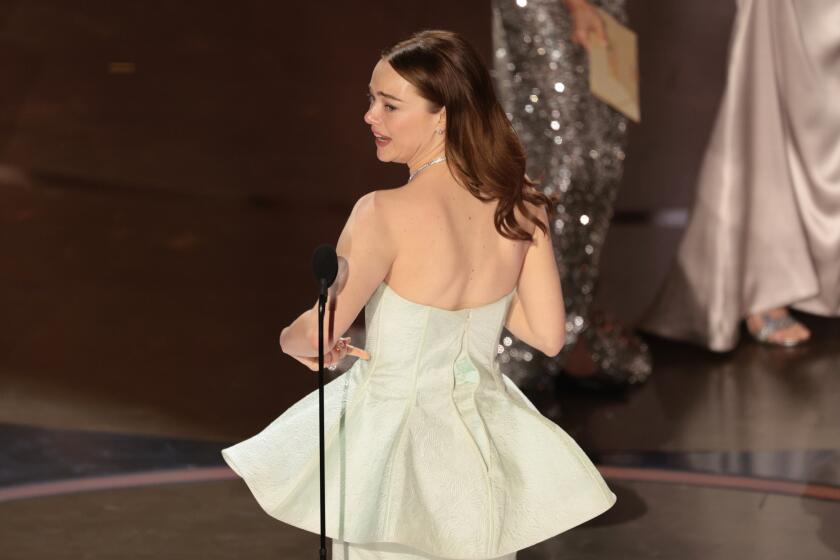Oscar’s lady in waiting
Picture this: Inside the Kodak Theatre on the evening of March 23, 2003, Nicole Kidman, Meryl Streep, Julianne Moore and Renee Zellweger wait eagerly for Denzel Washington to open the envelope and reveal this year’s best actress.
“And the winner is ... Nia Vardalos!”
OK, it is far-fetched. Conventional wisdom in Tinseltown holds that Vardalos, the former Second City comedian who wrote and starred in the worldwide indie blockbuster “My Big Fat Greek Wedding,” is at best a dark horse to be nominated for an Oscar, let alone win. Perhaps a Golden Globe, or even an Academy Award for best adapted screenplay, but not for best actress.
The Vardalos scenario illustrates an intriguing development for this year’s race. If Kidman, Streep, Moore and Zellweger are the leading candidates for Academy Award nominations, who is the fifth?
Based largely on word-of-mouth from people who have attended advance screenings, those four actresses appear to be early favorites: Kidman as author Virginia Woolf and Streep as a modern-day “Mrs. Dalloway” in the cross-generational drama “The Hours”; Moore as the quintessential 1950s housewife who must deal with racism in her community and her husband’s secret life as a homosexual in “Far From Heaven”; and Zellweger as a homicidal dancer in the musical “Chicago.”
If this scenario plays out, the fifth and final nomination would be up for grabs and the resulting competition could be fierce.
In one corner, contenders include veterans such as Diane Lane in “Unfaithful,” Sigourney Weaver in “The Guys,” Catherine Deneuve in “8 Women” and Emily Watson in “Punch-Drunk Love,” not to mention former Oscar winners Ellen Burstyn in “Divine Secrets of the Ya-Ya Sisterhood” and Gwyneth Paltrow in “Possession.”
In the other corner are relative newcomers such as Vardalos in “My Big Fat Greek Wedding,” Jennifer Aniston in “The Good Girl,” Salma Hayek in “Frida,” Alison Lohman in “White Oleander” and Maggie Gyllenhaal in “Secretary.”
In recent years, the Academy of Motion Picture Arts and Sciences has shown that it appreciates quality performances in the best actress category, whether by major stars or virtual novices.
Hilary Swank was a 25-year-old ingenue when she won the 1999 Oscar for best actress as a cross-dressing youth who is savagely murdered in a Nebraska town in “Boys Don’t Cry.”
The next year, academy voters rewarded superstar Julia Roberts with a golden statuette for her signature performance as a divorced mother who brings a giant California utility to its knees in “Erin Brockovich.”
Earlier this year, the Oscar went to Halle Berry, whose beauty often obscured her acting ability until “Monster’s Ball,” a gritty, independent movie about prison guards and racial bigotry, came along.
How does this year shape up?
“I think people are looking for something different, something to talk about,” said David Thomson, author of “The New Biographical Dictionary of Film.” That’s why he won’t rule out Vardalos, even though she stars in a family comedy, which academy voters tend to ignore.
Thomson also likes Aniston in “The Good Girl.”
“That, to me, was the kind of performance that impressed the industry. You have somebody doing comedy effortlessly for years on television and she takes on a more serious, more demanding role, one that doesn’t seem suited to her,” he noted. “Now, the film was not a huge hit. That’s important, although ‘Monster’s Ball’ was not a big hit when [Berry] was nominated.”
One performance that hasn’t received much attention in the U.S. is British actress Samantha Morton in “Morvern Callar.” The film, which could be too obscure for Oscar voters, tells the story of a supermarket clerk in a Scottish port town who awakens Christmas morning to find that her boyfriend has committed suicide -- and decides not to tell anyone.
“She’s staggering,” Thomson said of Morton, who was nominated for supporting actress in “Sweet and Lowdown,” but “it’s a small, English, independent film. Whether it will get a push or anything, I don’t know.”
Peter Rainer, the New York magazine film critic who also is chairman of the National Society of Film Critics, said that what strikes him about this year is the number of films in which many actresses give strong performances. “There seems to be a pileup of nominated actresses in multiple roles this year in both lead and supporting categories,” he said.
In “The Hours,” for example, Kidman, Streep and Moore could all qualify for best actress, since each appears in roughly a third of the film. Yet Paramount Pictures plans to conduct Oscar campaigns on behalf of Kidman and Streep for best actress, positioning Moore for best supporting actress. Moore, obviously, has a lot to say about it, and this would free Focus Films to launch an Oscar campaign on her behalf as best actress for “Far From Heaven.”
“If one is talking about nominating Julianne Moore,” Rainer said, “it is much more likely it will happen in that film, especially if Kidman and Streep are nominated for ‘The Hours.’ ” Besides, he said, the academy “would consider it a bit much putting all three actresses from the same film” up for best actress.
In “White Oleander,” Michelle Pfeiffer delivers what many consider one of her most compelling performances as a mother imprisoned for murdering a lover, but Warner Bros. has decided to position her for best supporting actress and mount a best-actress campaign for Lohman, who received strong reviews as Pfeiffer’s troubled daughter.
One possible surprise is Lane, whose performance in “Unfaithful” garnered good reviews even though the movie was not a breakout hit. Also hindering Lane’s chances is that the film came out in June. “Coming out early in the year is always an uphill struggle,” Rainer said. “The film had mixed reviews. She is sort of a sentimental favorite who has been around the business since she was a kid. She’s a good actress who never quite landed a great role.”
As for Kidman, Rainer said her divorce from Tom Cruise could actually enhance her chances since many in Hollywood came to sympathize with her. “I think Hollywood, as nasty as it can be, can also be very gushy and, in her case, I think there is more sympathy since her split-up than there is with him,” Rainer said.
One of the more intriguing questions is what academy voters will think of Gyllenhaal, whose movie “Secretary” revolves around a young woman with a pain fetish who likes to be spanked by her boss.
The subject of sadomasochism might be too offensive for some academy voters, but the film and Gyllenhaal have garnered their share of strong reviews. Roger Ebert wrote that Gyllenhaal “avoids numerous opportunities to make her character seem pathetic, and makes her seem plucky instead -- intent on establishing herself and making herself necessary.” The Times’ Manohla Dargis wrote that the actress “makes the character more complex than it’s written.”
“You could not persuade anybody to see ‘Secretary’ if Maggie didn’t walk an extremely fine line throughout all of that film,” said Tom Ortenberg, president of Lions Gate Films, which plans to aggressively push Gyllenhaal for best actress.
That brings us to Vardalos. Her made-for-Hollywood Cinderella story could win over voters. Plus, her movie was produced by industry heavyweights Tom Hanks and his wife, Rita Wilson. “It’s not out of the question by any means,” Daily Variety film critic Todd McCarthy said of Vardalos’ chances of capturing an Oscar nod for best actress. “People sympathize with her story, playing the role herself instead of letting others do it .... I think she’ll probably get a huge Golden Globe push that might be contagious” with voters.
Gary Goetzman, co-producer of “My Big Fat Greek Wedding,” said the movie has been such a phenomenal success that academy voters are well aware of the movie and her performance.
“Almost everybody in the United States has seen this picture or known people who have,” he said. “It doesn’t require us to say, ‘Hey, here is a picture you’ve missed.’ They can judge it for what it is and act accordingly.”
More to Read
Only good movies
Get the Indie Focus newsletter, Mark Olsen's weekly guide to the world of cinema.
You may occasionally receive promotional content from the Los Angeles Times.






